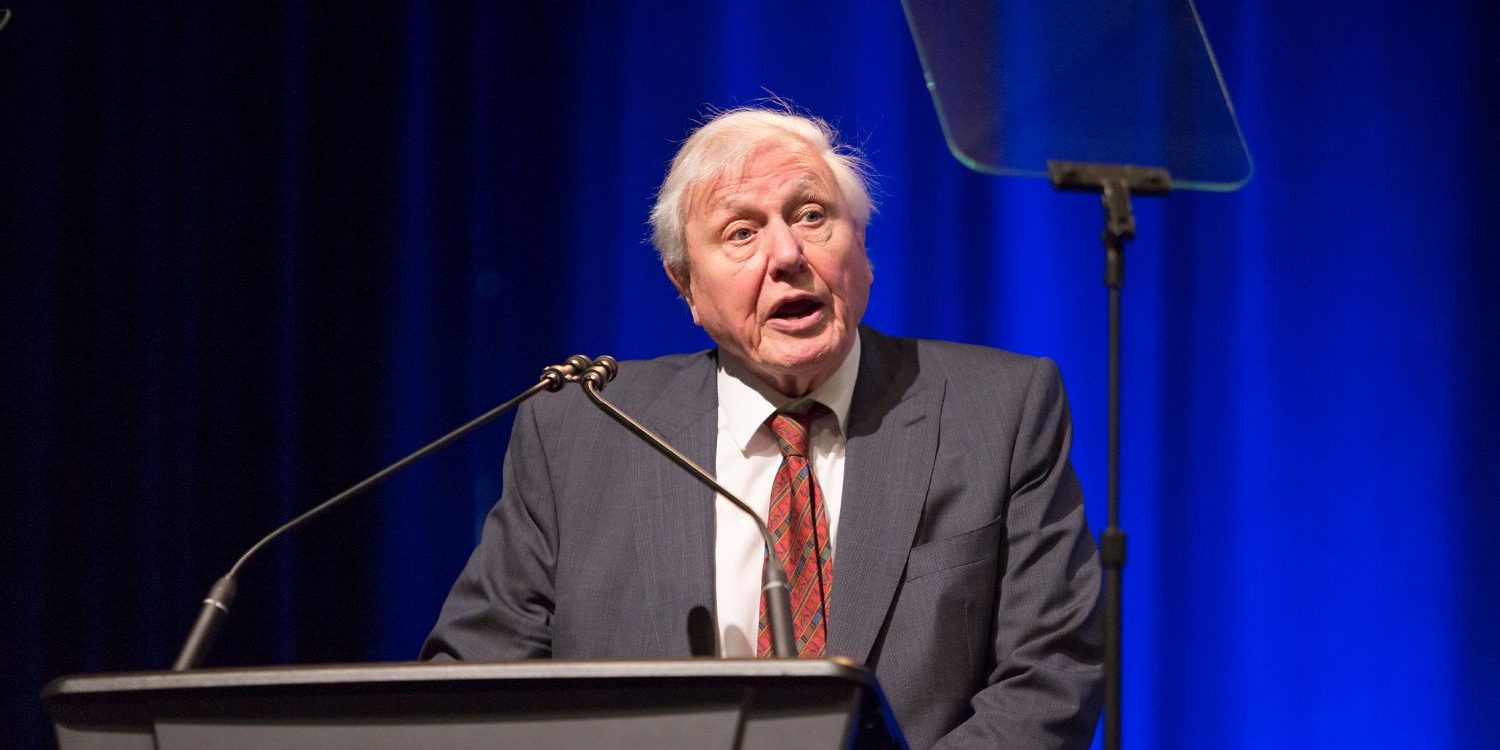“The greatest message he’s ever told”: David Attenborough’s Ocean
As Sir David Attenborough reaches his 99th year on our planet, he extends an urgent appeal against the wreckage of our oceans through his impactful film Ocean. In the opening scenes, he states: “After almost 100 years on the planet, I now understand the most important place on Earth is not on land, but at sea.”
The film was released in cinemas ahead of the UN’s World Oceans Day on 8 June, which advocates for the protection of 30% of our oceans from exploitation. Currently, only 2.8% of the seas are protected in this way. Attenborough makes a powerful statement about the destruction caused by industrial overfishing and trawl fishing, tearing up the seabed and wasting enormous quantities of marine life. The film presents the ocean as the support system for our planet, and a powerful force against the climate crisis.
Trawl fishing contributes heavily to global warming due to the carbon dioxide released into the atmosphere during the process
The film’s premiere was attended by a host of big names, including King Charles, Tim Peake, James Blunt, and Cara Delevingne. Additionally, Prince William attended a matinée with hundreds of schoolchildren from across the country. The producer of Ocean, Toby Nowlan, said: “This is not about seeing brand new natural history behaviours. It is the greatest message he’s ever told.”
Ocean is made up of both beautiful and shocking new footage, notably showing the heavy chains dragged by trawler boats which demolish the seafloor, forcing all marine life into its net. Often, it is only a single species that they are looking for, and all other catch is discarded back into the ocean, leaving behind a marine ghost town on the seabed. Trawl fishing footage serves as a disturbing example of how industrial-scale fishing is rapidly destroying our oceans. “It’s hard to imagine a more wasteful way to catch fish,” observes Sir David.
Trawl fishing contributes heavily to global warming due to the carbon dioxide released into the atmosphere during the process. Shockingly, bottom trawling is not only permitted, but is actively encouraged by governments across the world, causing a loss of hope for many climate activists.
Harmful practices such as trawl fishing are not a necessity – there are alternative, more sustainable approaches that have been in existence for hundreds of years
However, Attenborough reinforces the fact that not all hope is lost, as our ocean can “recover faster than we had ever imagined,” referencing increased whale populations as a source of hope. In the 20th century, it is estimated that around 2.9 million whales were killed due to the whaling industry, which pushed all whale species to the brink of extinction. Attenborough recalls when only 4% of Blue Whales were left: “I remember thinking that was it. There was no coming back, we had lost the great whales.” But, in 1986, commercial whaling was banned due to public outrage, and since then the whale population has made a miraculous recovery.
Although I was aware of industrial overfishing, I was not informed on quite how devastating the consequences are and its impact on our lives on land. Watching Ocean enlightened me about our oceans’ role in preserving life on Earth, and I now understand the frustration towards government inaction, especially because the solutions are not as complex as you might expect. Harmful practices such as trawl fishing are not a necessity – there are alternative, more sustainable approaches that have been in existence for hundreds of years. Additionally, if we could increase the scope of ocean protection from industrial interference from 2.8%, our marine life has a chance to bounce back and recover.
One example is that of the Papahānaumokuākea Marine National Monument which has been under various forms of protection since 2000. Over the past 25 years, marine life has made a profound recovery, leaving its 582,570 square miles of Pacific Ocean waters abundant with sea creatures.
[Ocean] did encourage me to pay close attention to my own impact on the planet and write articles which might encourage others to reflect and educate themselves on our climate crisis
When I went to see this film, I was simply looking forward to another Attenborough wildlife documentary. I did not expect to leave the cinema with such a profound new perspective on our climate crisis and the power of our ocean in the next chapter of protecting the planet.
I strongly believe that everyone should watch Ocean, as it helped me to reflect on my own role in the protection of our planet. Could I honestly say that I cared about our climate when I was consuming products sourced in such a harmful way? Are there small ways in which I can be a part of the solution? Although the film left me feeling frustrated that I cannot single-handedly save our ocean, and at the lack of action from those in power, it did encourage me to pay close attention to my own impact on the planet and write articles which might encourage others to reflect and educate themselves on our climate crisis.
In the week that I watched Ocean, I happened to be working on an article about Climate Anxiety, and found that this film heavily influenced how I approached that article. I left the film feeling as though climate anxiety is potentially what will save our planet. After watching the film, my way of thinking changed entirely, and I have since made changes to both my diet and lifestyle in the hope that I can have even a miniscule impact. Perhaps if all world leaders, celebrities, and politicians watched Ocean, they would be inspired to use their influence to make the large-scale necessary changes that could change the fate of our planet.

Comments